Choosing the right diet for your cat is essential for their health. Rabbit cat food has become a popular choice, especially for cats with food allergies or sensitivities. It provides high-quality protein and essential nutrients, making it a great option for pet owners who want the best nutrition.
Many commercial cat foods use chicken, beef, or fish, which can cause allergic reactions. Rabbit meat is a novel protein, meaning most cats haven’t been exposed to it before. This reduces the risk of allergies and supports cat digestive health. It is also high in protein and low in fat, helping maintain lean muscle and energy levels.
If you want a healthier, more natural diet for your cat, rabbit-based pet food is a great option. In this guide, we’ll cover why it stands out, its key nutrients, how to choose the best option, and tips for a smooth transition. Let’s get started!
Why Choose Rabbit Cat Food?
A Novel Protein Source
Many commercial cat foods contain common proteins like chicken, beef, or fish, but these ingredients can trigger food sensitivities and allergies in some cats. Rabbit cat food provides a novel protein source, meaning it is less likely to cause allergic reactions because most cats have never been exposed to it before. If your cat suffers from chronic digestive issues, itchy skin, or frequent ear infections, switching to rabbit-based pet food could help eliminate these problems by reducing exposure to allergens.
In addition to being hypoallergenic, rabbit meat is also highly digestible, making it easier on a cat’s stomach. Cats with sensitive stomachs or inflammatory bowel disease (IBD) often benefit from a diet with limited ingredients and a single, high-quality protein source. Rabbit-based pet food checks both of these boxes, providing relief for cats struggling with food intolerance.
High-Protein & Nutrient-Rich
Cats need to eat meat to stay healthy. This is because their bodies are made to get nutrition from animal food. Rabbit meat is naturally high in protein and packed with essential amino acids, making it an ideal choice for supporting lean muscle development, energy levels, and overall feline health. Unlike lower-quality proteins that contain fillers and artificial additives, rabbit cat food delivers pure, species-appropriate nutrition that aligns with what cats would eat in the wild.
Beyond protein, rabbit meat contains essential nutrients like taurine, vitamin B12, and iron, which are critical for a cat’s vision, heart function, and immune system. Taurine, in particular, plays a crucial role in preventing heart disease and maintaining overall health. Since cats cannot produce enough taurine on their own, they must obtain it from their diet, and rabbit meat provides an excellent natural source.
Supports Digestive Health
Cats with sensitive stomachs often struggle with common proteins found in commercial cat food. Many formulas contain artificial additives, grains, or excess fat, which can cause digestive upset. Rabbit cat food, especially when part of a limited ingredient diet, helps reduce these issues by using high-quality, easily digestible ingredients without unnecessary fillers.
Rabbit meat is naturally lean and low in fat, making it gentle on a cat’s digestive system. This helps reduce problems like vomiting, diarrhea, and gas, which are common in cats with food sensitivities. Many rabbit-based pet foods are also grain-free, eliminating ingredients like wheat, corn, or soy, which can cause bloating, inflammation, and allergic reactions.
A diet rich in rabbit meat supports a healthy gut microbiome, which is essential for digestion and nutrient absorption. When digestion improves, cats can absorb more essential nutrients, leading to better energy levels, a shinier coat, and overall improved health.
If your cat experiences stomach discomfort, irregular bowel movements, or chronic digestive issues, switching to rabbit-based cat food may help. Many pet owners notice better digestion, more consistent stools, and increased comfort after making the switch. By choosing a gentle, highly digestible protein source, you can help your cat enjoy their meals without discomfort and support their long-term health.
Key Nutrients in Rabbit Cat Food
Taurine & Essential Amino Acids
Taurine is one of the most critical nutrients in a cat’s diet. Unlike some animals, cats cannot produce enough taurine on their own, so they must obtain it from their food. A deficiency can lead to severe health issues, including heart disease, vision problems, and a weakened immune system. Rabbit cat food naturally contains taurine, making it a great choice for supporting overall feline health.
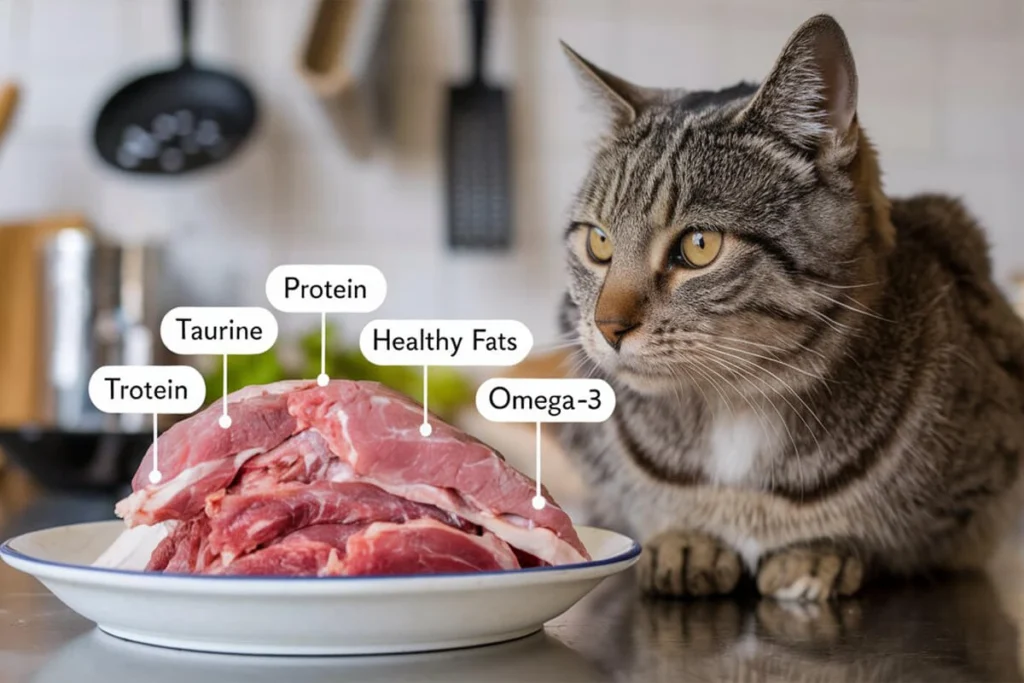
In addition to taurine, rabbit meat provides essential amino acids that contribute to muscle growth, organ function, and a healthy metabolism. These amino acids are crucial for maintaining a cat’s lean muscle mass, keeping them active, and ensuring their body functions properly. Since cats rely on animal protein for these nutrients, a diet rich in high-quality rabbit meat helps them thrive.
Healthy Fats & Omegas
A well-balanced diet includes not only protein but also the right types of fats. Rabbit meat contains healthy fats and omega fatty acids, which are essential for a cat’s skin, coat, and overall well-being. Omega-3 and omega-6 fatty acids help reduce inflammation, promote a shiny coat, and support brain function.
Cats with dry or itchy skin often benefit from a diet that includes omega-rich ingredients. Rabbit-based pet food naturally provides these essential fats without excess unhealthy additives. Unlike lower-quality cat foods that rely on artificial fats or plant-based oils, rabbit cat food delivers the nutrients in a form that is more bioavailable and beneficial for your cat’s body.
Grain-Free & Limited Ingredient Benefits
Many cats struggle with grains like wheat, corn, or soy, which can lead to digestive upset, allergies, and inflammation. Rabbit cat food is often grain-free, reducing the risk of food sensitivities and supporting a cat’s natural carnivorous diet. Since cats do not need carbohydrates to thrive, eliminating grains helps improve digestion and prevents unnecessary weight gain.
In addition to being grain-free, rabbit-based pet food is commonly formulated as a limited ingredient diet (LID), meaning it contains fewer components that could trigger allergies. A simple formula with rabbit as the primary protein source and minimal additional ingredients makes it easier for cats to digest while reducing the risk of reactions to common allergens. For pet owners looking to provide their cats with a clean, natural, and highly digestible diet, a grain-free, limited ingredient rabbit cat food is an excellent choice.
Choosing the Best Rabbit Cat Food
Wet vs. Dry Cat Food
Choosing between wet and dry cat food is an important decision that can impact your cat’s health and hydration levels. Rabbit cat food is available in both wet and dry varieties, each offering unique benefits.
Wet food contains a higher moisture content, making it an excellent choice for cats who don’t drink enough water. Proper hydration supports cat digestive health, prevents urinary tract infections, and promotes kidney function. Additionally, wet food is often more palatable and easier to chew, making it a great option for picky eaters or senior cats.
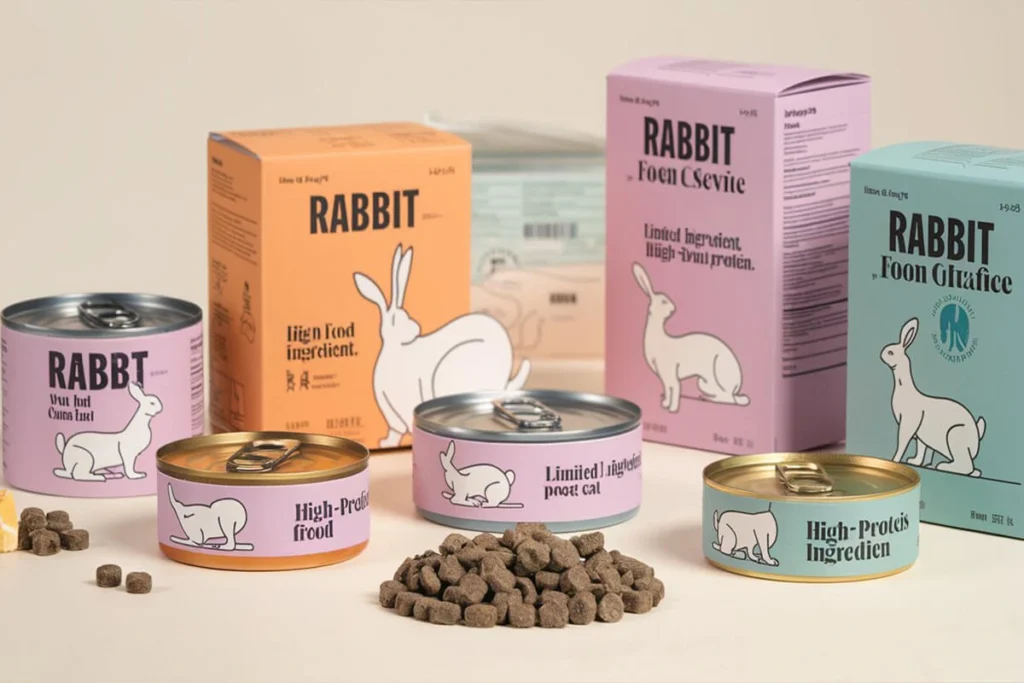
Dry rabbit cat food, on the other hand, provides convenience and a longer shelf life. Many dry formulas still deliver high-protein nutrition while offering the benefit of helping clean teeth through chewing. However, because dry food contains less moisture, it’s important to ensure your cat drinks enough water throughout the day.
Both options can be beneficial, and many cat owners choose to combine wet and dry food to provide variety and balanced nutrition. The key is to select premium cat food made with high-quality rabbit meat to ensure your cat receives the best nutrients in either form.
Limited Ingredient & Hypoallergenic Options
Cats with food sensitivities or allergies require a diet that minimizes exposure to common allergens. Limited ingredient rabbit cat food is designed to provide essential nutrients without unnecessary fillers, artificial additives, or multiple protein sources that could trigger a reaction.
Rabbit is a novel protein that is unlikely to cause allergies, making it an ideal choice for cats with itchy skin, digestive upset, or chronic inflammation. When paired with a simple formula free from grains, dairy, and artificial preservatives, hypoallergenic cat food made with rabbit can help reduce symptoms and improve overall well-being.
When selecting a limited ingredient diet, check the label to ensure rabbit is the primary protein source, and avoid products that include by-products or low-quality fillers. Choosing a high-quality, veterinary-recommended cat food with limited ingredients can make a significant difference for cats with dietary sensitivities.
Veterinary-Recommended Brands
Not all rabbit cat food is created equal, so it’s essential to choose brands that meet high nutritional standards. Many veterinarians recommend rabbit-based pet food for cats with food allergies, sensitive stomachs, or inflammatory conditions. These brands use premium-quality rabbit meat and avoid unnecessary additives that could cause health issues.
Some trusted brands formulate their rabbit cat food as grain-free, high-protein, and limited ingredient, ensuring optimal feline nutrition. Wet and dry options are available, so you can choose the best fit for your cat’s dietary needs. Before making the switch, consult your vet to find a brand that aligns with your cat’s specific health requirements.
By selecting a veterinary-approved rabbit-based cat food, you can ensure your cat gets the best possible diet for a healthy, active life.
Transitioning Your Cat to a Rabbit-Based Diet
Slow Introduction Tips
Switching your cat to rabbit cat food requires a gradual transition to prevent digestive upset and encourage acceptance. Cats can be picky eaters, so introducing a new protein source slowly helps them adjust without stress.
Start by mixing a small amount of rabbit-based food into their current diet. Use a ratio of 75% old food and 25% new food for the first few days. Gradually increase the proportion of rabbit cat food over 7–10 days, adjusting based on how well your cat tolerates the change. If your cat hesitates to try the new food, warming it slightly or adding a bit of water can enhance its aroma and appeal.
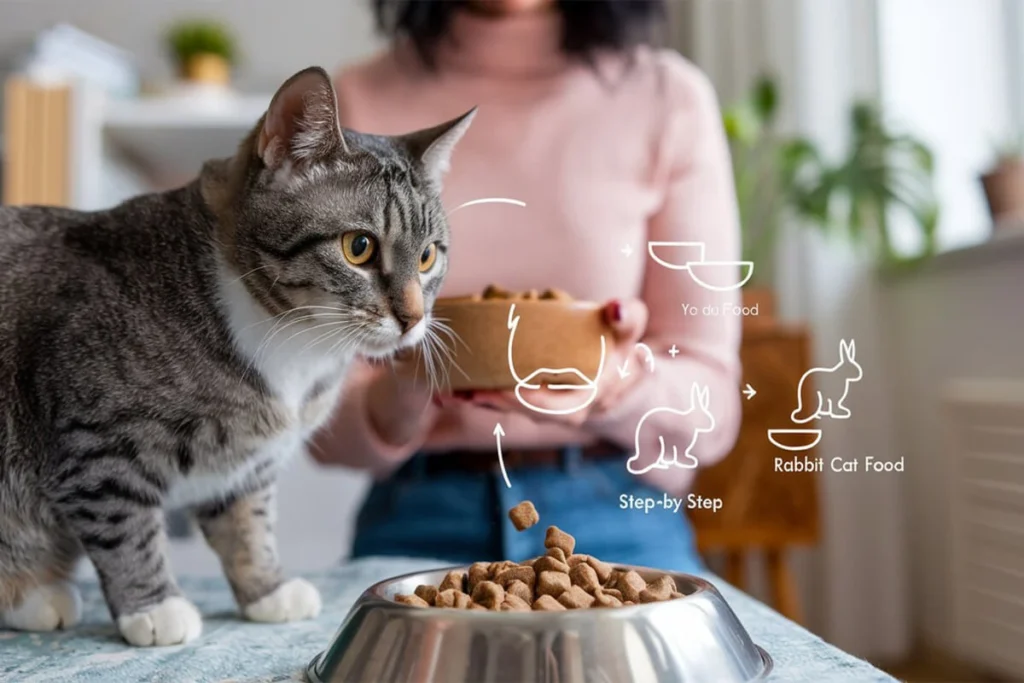
Patience is key during this transition. Some cats may take longer to accept new food, but forcing an abrupt switch can cause digestive discomfort or refusal to eat. Sticking to a slow, steady introduction helps ensure a smooth adjustment to their new, high-protein diet.
Monitoring Your Cat’s Health
As you transition your cat to rabbit-based pet food, observe any changes in their digestion, energy levels, coat condition, and overall health. Positive signs of a successful diet switch include:
- Improved digestion – Fewer instances of vomiting, diarrhea, or constipation.
- Healthy skin and coat – Shinier fur, reduced itching, and fewer signs of allergies.
- Increased energy and appetite – A healthier, more active cat with stable eating habits.
If you notice any negative reactions, such as persistent stomach upset, reduced appetite, or unusual behavior, consult your veterinarian. Some cats may require a slower transition or a different limited ingredient diet to better suit their needs. Regular vet checkups can help confirm that your cat is thriving on their new, premium cat food.
Common Mistakes to Avoid
Many cat owners unintentionally make mistakes when switching to rabbit cat food, which can lead to digestive issues or food refusal. Avoid these common pitfalls:
- Switching too quickly – A sudden change in diet can cause stomach upset and rejection of the new food. Always transition gradually over at least a week.
- Not checking ingredient quality – Some rabbit-based foods may contain fillers, artificial additives, or by-products. Choose high-quality, limited ingredient, and grain-free options for the best nutrition.
- Ignoring hydration – If switching to dry rabbit cat food, ensure your cat drinks enough water. Cats on dry diets are prone to dehydration and urinary issues.
- Giving up too soon – Some cats take time to accept new food. If your cat hesitates at first, try adding warm water, mixing in a small amount of their favorite wet food, or experimenting with different brands.
By following the right transition steps and avoiding these mistakes, you can successfully introduce rabbit-based pet food while ensuring your cat stays healthy and happy.
Final Thoughts on Rabbit Cat Food
Recap the Benefits of Rabbit Cat Food for Sensitive and Health-Conscious Cats
Choosing the right diet is crucial for your cat’s health and well-being, especially if they have food sensitivities or digestive issues. Rabbit cat food is a novel protein source that helps reduce allergies while providing high-quality nutrition. Since rabbit meat is high in protein, low in fat, and rich in essential nutrients, it closely mimics what cats would eat in the wild. This makes it a great choice for pet owners who want to support their cat’s overall health.
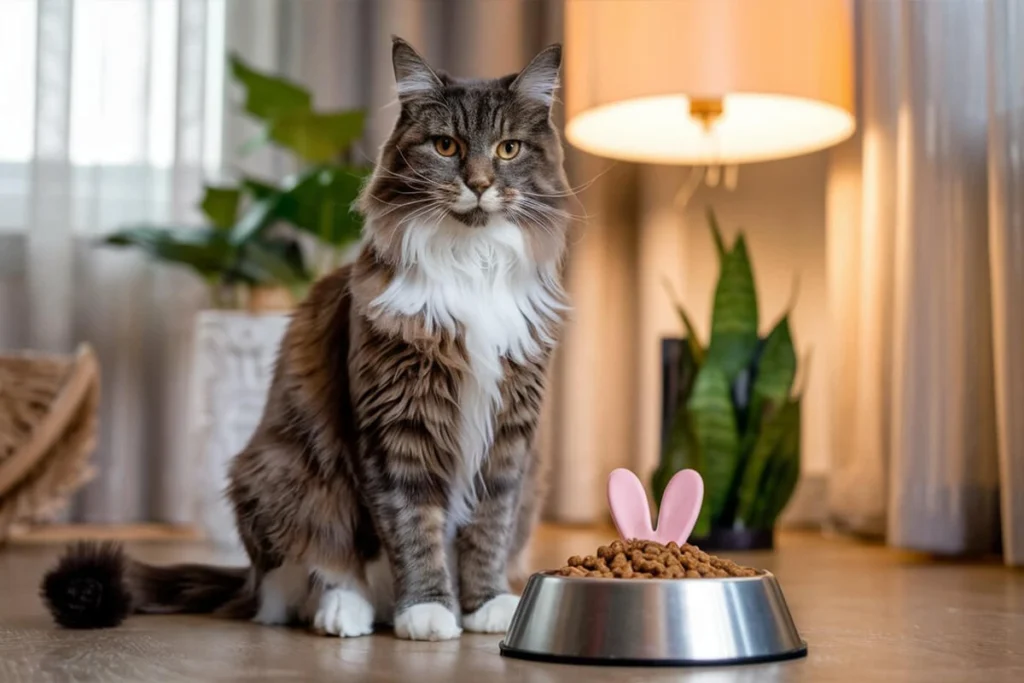
For cats with sensitive stomachs, food allergies, or inflammatory conditions, rabbit-based pet food offers a hypoallergenic, grain-free, and highly digestible alternative to common proteins like chicken, beef, or fish. Many commercial cat foods contain fillers, artificial additives, and allergens that can trigger digestive issues, skin irritations, or inflammation. Switching to a limited ingredient diet with rabbit can help improve digestion, coat health, and energy levels, making a noticeable difference in your cat’s quality of life.
If you’re searching for a premium cat food that promotes feline nutrition and digestive health, rabbit-based pet food is a healthy, natural, and beneficial option. It provides everything your cat needs to stay active, strong, and happy for years to come.
Emphasize the Importance of High-Quality, Protein-Rich, and Balanced Feline Nutrition
Cats are obligate carnivores, meaning their bodies require animal-based protein to survive and thrive. A proper feline diet should be high in protein, moderate in fat, and low in carbohydrates to support muscle maintenance, energy production, and overall health. Rabbit cat food meets these dietary requirements by providing a lean, high-protein, and nutrient-dense meal that aligns with a cat’s natural eating habits.
In addition to protein, essential nutrients like taurine, omega fatty acids, vitamins, and minerals play a crucial role in maintaining heart health, vision, immune function, and a healthy coat. High-quality rabbit-based pet food is often formulated with minimal fillers, no artificial additives, and grain-free ingredients, ensuring that every bite contributes to your cat’s optimal health and longevity.
When selecting the right rabbit cat food, always prioritize brands that use real, whole rabbit meat as the primary protein source. Avoid products that contain by-products, artificial preservatives, or unnecessary fillers, as these can compromise the nutritional value of the food. A well-balanced feline diet ensures that your cat receives all the essential nutrients needed to support a healthy, active lifestyle.
Encourage Pet Owners to Consult a Vet Before Making Dietary Changes
Rabbit cat food offers many health benefits, but it’s important to consult a veterinarian before making any major dietary changes. Every cat has unique nutritional needs, and a vet can help determine if rabbit-based pet food is the right choice based on age, weight, activity level, and overall health.
A veterinarian can also guide you through a proper transition plan to prevent digestive issues. Sudden diet changes can cause stomach upset, refusal to eat, or irregular bowel movements. A slow and structured introduction ensures your cat adjusts comfortably. If your cat has food allergies, kidney concerns, or digestive disorders, your vet may recommend a specialized rabbit-based formula or a veterinary-approved brand that meets their needs.
Making informed choices about your cat’s diet is essential for long-term health and well-being. By selecting high-quality, protein-rich rabbit cat food and consulting a vet, you can ensure your cat gets the best possible nutrition. A well-balanced diet supports a healthy, active, and happy life, helping your feline companion thrive.
What’s the best Cat Food Every Owner Should Know About?
Discover the Top Dry Cat Food For a Healthy & Happy Feline.
Do Cats Really Love Cakes, Find Out Here!
Get Some Good Stuff for your Cat From Pet MD Official
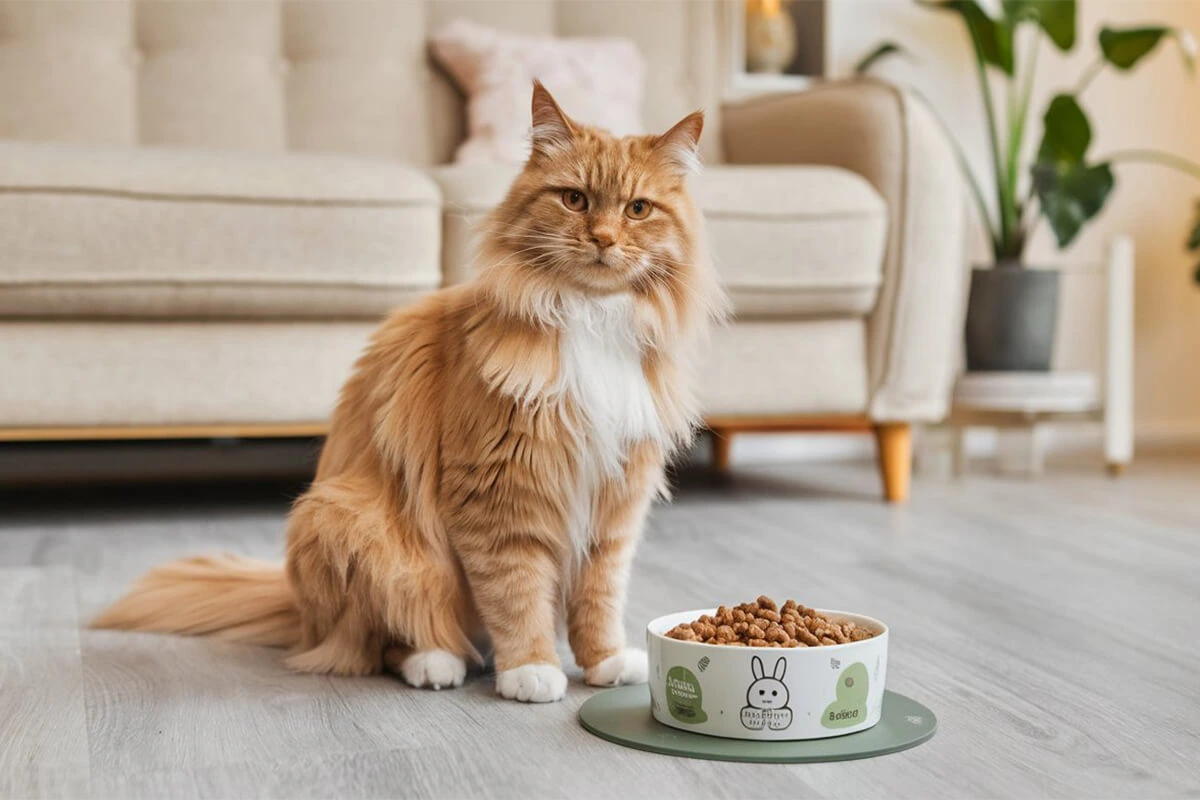
2 thoughts on “Rabbit Cat Food: How to Give Your Cat the Best, Healthiest Diet”
Comments are closed.